The Impact of COVID-19 on Emotional Wellbeing in Adults in India, 2020
VerifiedAdded on 2023/01/06
|61
|18315
|23
Thesis and Dissertation
AI Summary
This dissertation investigates the impact of the COVID-19 pandemic on the emotional wellbeing of adults in India during 2020. It explores the effects of lockdowns, social isolation, and fear on mental health, examining the prevalence of anxiety, stress, and other emotional difficulties. The study utilizes a mixed-methods approach, including secondary research and surveys, to gather in-depth data on how individuals coped with the challenges posed by the pandemic. The findings reveal that many participants engaged in activities like yoga, meditation, and hobbies to mitigate anxiety and emotional distress. The research also highlights the importance of self-care strategies and the need for mental health support during times of crisis. The study includes an introduction to the global pandemic, the effects of COVID-19 restrictions, a detailed research methodology, results from the study, a discussion and conclusion, along with recommendations, and a list of references. The dissertation is a valuable resource for understanding the psychological impact of the pandemic and the strategies that can be used to promote emotional wellbeing.
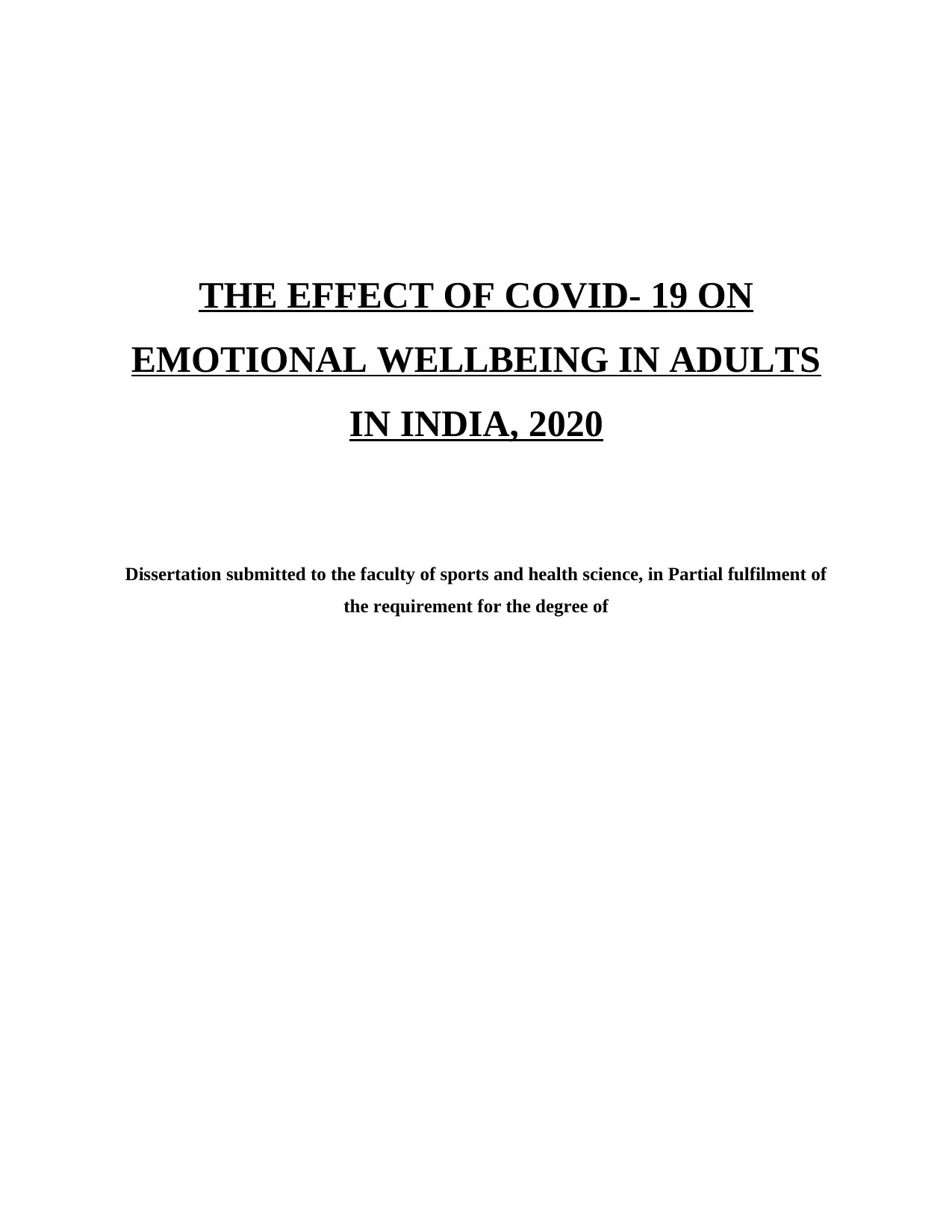
THE EFFECT OF COVID- 19 ON
EMOTIONAL WELLBEING IN ADULTS
IN INDIA, 2020
Dissertation submitted to the faculty of sports and health science, in Partial fulfilment of
the requirement for the degree of
EMOTIONAL WELLBEING IN ADULTS
IN INDIA, 2020
Dissertation submitted to the faculty of sports and health science, in Partial fulfilment of
the requirement for the degree of
Paraphrase This Document
Need a fresh take? Get an instant paraphrase of this document with our AI Paraphraser
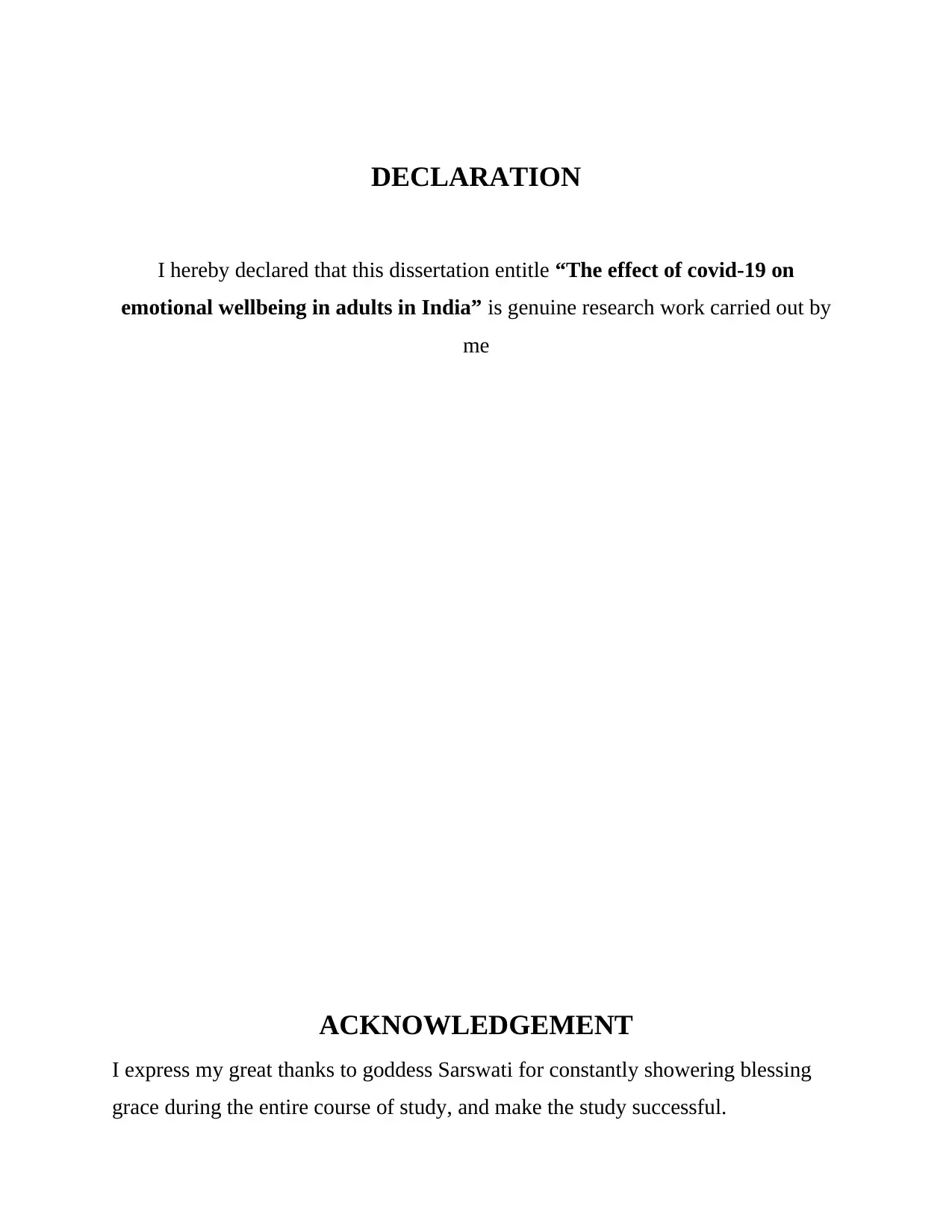
DECLARATION
I hereby declared that this dissertation entitle “The effect of covid-19 on
emotional wellbeing in adults in India” is genuine research work carried out by
me
ACKNOWLEDGEMENT
I express my great thanks to goddess Sarswati for constantly showering blessing
grace during the entire course of study, and make the study successful.
I hereby declared that this dissertation entitle “The effect of covid-19 on
emotional wellbeing in adults in India” is genuine research work carried out by
me
ACKNOWLEDGEMENT
I express my great thanks to goddess Sarswati for constantly showering blessing
grace during the entire course of study, and make the study successful.
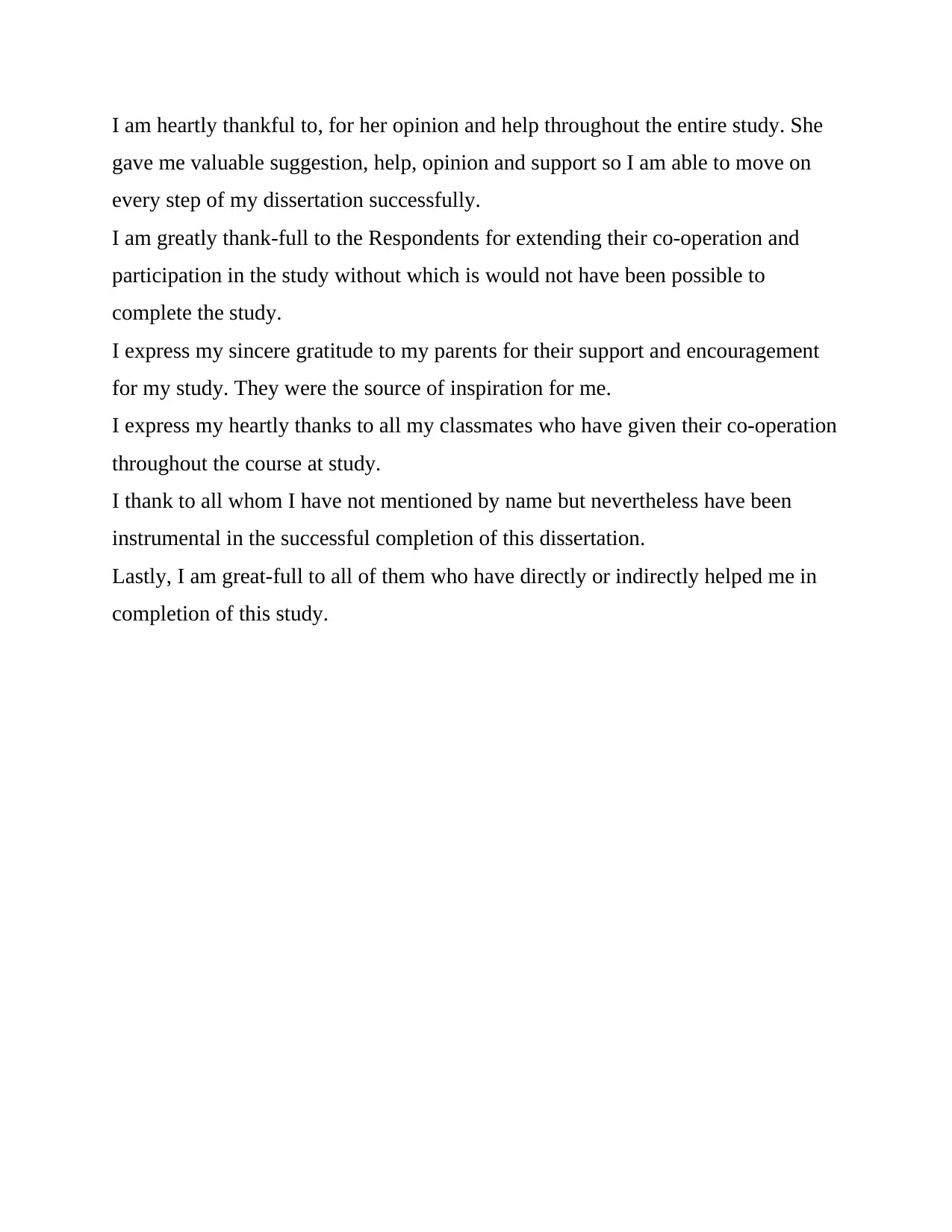
I am heartly thankful to, for her opinion and help throughout the entire study. She
gave me valuable suggestion, help, opinion and support so I am able to move on
every step of my dissertation successfully.
I am greatly thank-full to the Respondents for extending their co-operation and
participation in the study without which is would not have been possible to
complete the study.
I express my sincere gratitude to my parents for their support and encouragement
for my study. They were the source of inspiration for me.
I express my heartly thanks to all my classmates who have given their co-operation
throughout the course at study.
I thank to all whom I have not mentioned by name but nevertheless have been
instrumental in the successful completion of this dissertation.
Lastly, I am great-full to all of them who have directly or indirectly helped me in
completion of this study.
gave me valuable suggestion, help, opinion and support so I am able to move on
every step of my dissertation successfully.
I am greatly thank-full to the Respondents for extending their co-operation and
participation in the study without which is would not have been possible to
complete the study.
I express my sincere gratitude to my parents for their support and encouragement
for my study. They were the source of inspiration for me.
I express my heartly thanks to all my classmates who have given their co-operation
throughout the course at study.
I thank to all whom I have not mentioned by name but nevertheless have been
instrumental in the successful completion of this dissertation.
Lastly, I am great-full to all of them who have directly or indirectly helped me in
completion of this study.
⊘ This is a preview!⊘
Do you want full access?
Subscribe today to unlock all pages.

Trusted by 1+ million students worldwide
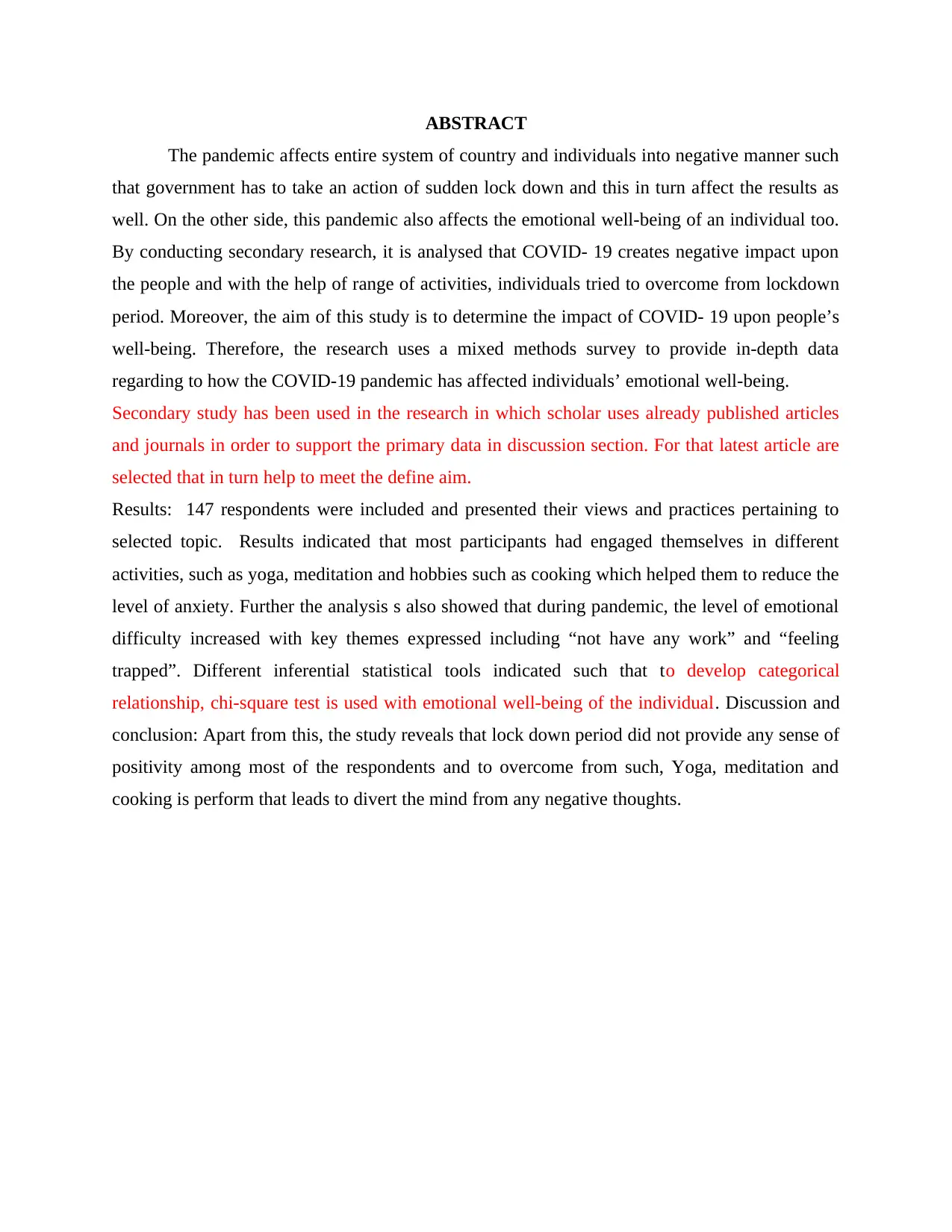
ABSTRACT
The pandemic affects entire system of country and individuals into negative manner such
that government has to take an action of sudden lock down and this in turn affect the results as
well. On the other side, this pandemic also affects the emotional well-being of an individual too.
By conducting secondary research, it is analysed that COVID- 19 creates negative impact upon
the people and with the help of range of activities, individuals tried to overcome from lockdown
period. Moreover, the aim of this study is to determine the impact of COVID- 19 upon people’s
well-being. Therefore, the research uses a mixed methods survey to provide in-depth data
regarding to how the COVID-19 pandemic has affected individuals’ emotional well-being.
Secondary study has been used in the research in which scholar uses already published articles
and journals in order to support the primary data in discussion section. For that latest article are
selected that in turn help to meet the define aim.
Results: 147 respondents were included and presented their views and practices pertaining to
selected topic. Results indicated that most participants had engaged themselves in different
activities, such as yoga, meditation and hobbies such as cooking which helped them to reduce the
level of anxiety. Further the analysis s also showed that during pandemic, the level of emotional
difficulty increased with key themes expressed including “not have any work” and “feeling
trapped”. Different inferential statistical tools indicated such that to develop categorical
relationship, chi-square test is used with emotional well-being of the individual. Discussion and
conclusion: Apart from this, the study reveals that lock down period did not provide any sense of
positivity among most of the respondents and to overcome from such, Yoga, meditation and
cooking is perform that leads to divert the mind from any negative thoughts.
The pandemic affects entire system of country and individuals into negative manner such
that government has to take an action of sudden lock down and this in turn affect the results as
well. On the other side, this pandemic also affects the emotional well-being of an individual too.
By conducting secondary research, it is analysed that COVID- 19 creates negative impact upon
the people and with the help of range of activities, individuals tried to overcome from lockdown
period. Moreover, the aim of this study is to determine the impact of COVID- 19 upon people’s
well-being. Therefore, the research uses a mixed methods survey to provide in-depth data
regarding to how the COVID-19 pandemic has affected individuals’ emotional well-being.
Secondary study has been used in the research in which scholar uses already published articles
and journals in order to support the primary data in discussion section. For that latest article are
selected that in turn help to meet the define aim.
Results: 147 respondents were included and presented their views and practices pertaining to
selected topic. Results indicated that most participants had engaged themselves in different
activities, such as yoga, meditation and hobbies such as cooking which helped them to reduce the
level of anxiety. Further the analysis s also showed that during pandemic, the level of emotional
difficulty increased with key themes expressed including “not have any work” and “feeling
trapped”. Different inferential statistical tools indicated such that to develop categorical
relationship, chi-square test is used with emotional well-being of the individual. Discussion and
conclusion: Apart from this, the study reveals that lock down period did not provide any sense of
positivity among most of the respondents and to overcome from such, Yoga, meditation and
cooking is perform that leads to divert the mind from any negative thoughts.
Paraphrase This Document
Need a fresh take? Get an instant paraphrase of this document with our AI Paraphraser
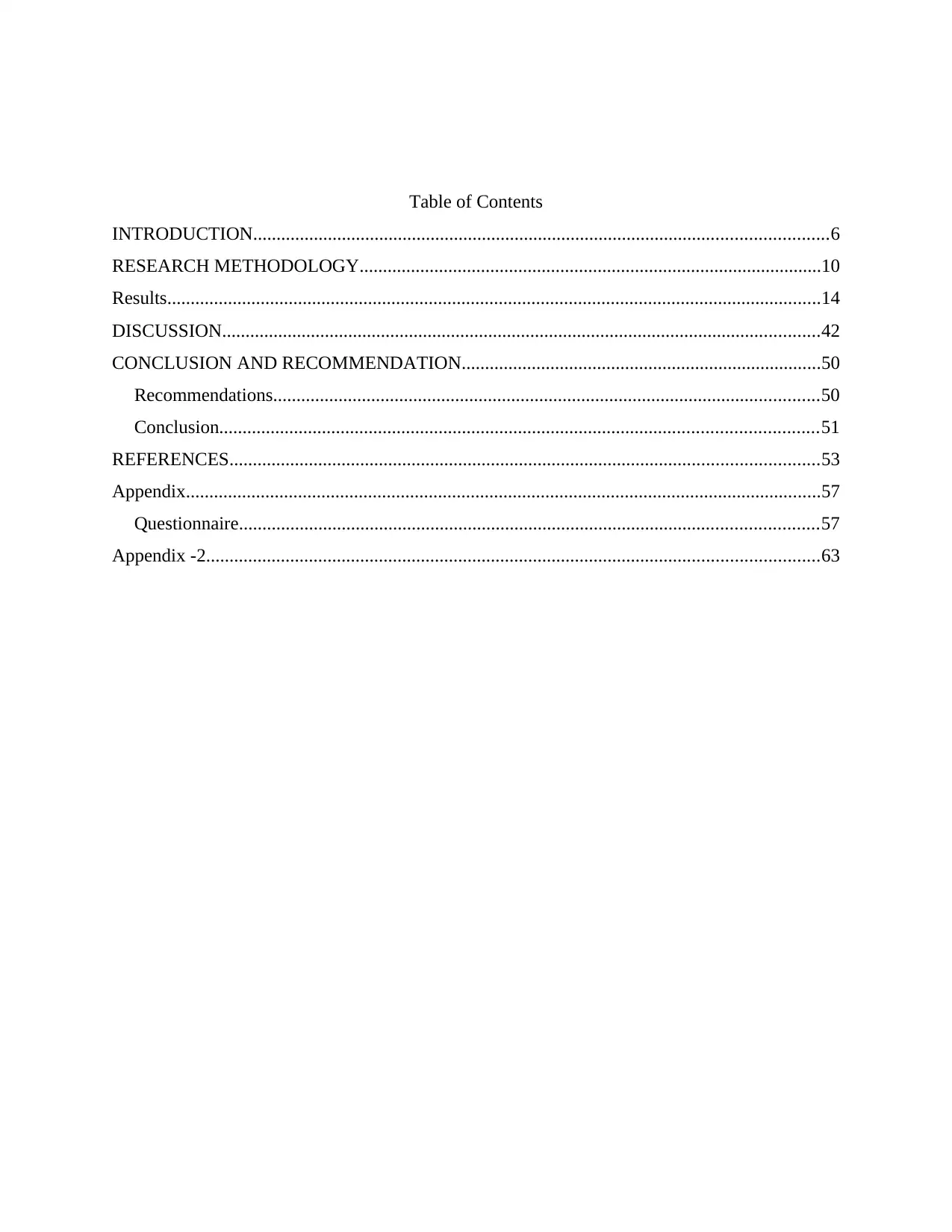
Table of Contents
INTRODUCTION...........................................................................................................................6
RESEARCH METHODOLOGY...................................................................................................10
Results............................................................................................................................................14
DISCUSSION................................................................................................................................42
CONCLUSION AND RECOMMENDATION.............................................................................50
Recommendations.....................................................................................................................50
Conclusion................................................................................................................................51
REFERENCES..............................................................................................................................53
Appendix........................................................................................................................................57
Questionnaire............................................................................................................................57
Appendix -2...................................................................................................................................63
INTRODUCTION...........................................................................................................................6
RESEARCH METHODOLOGY...................................................................................................10
Results............................................................................................................................................14
DISCUSSION................................................................................................................................42
CONCLUSION AND RECOMMENDATION.............................................................................50
Recommendations.....................................................................................................................50
Conclusion................................................................................................................................51
REFERENCES..............................................................................................................................53
Appendix........................................................................................................................................57
Questionnaire............................................................................................................................57
Appendix -2...................................................................................................................................63
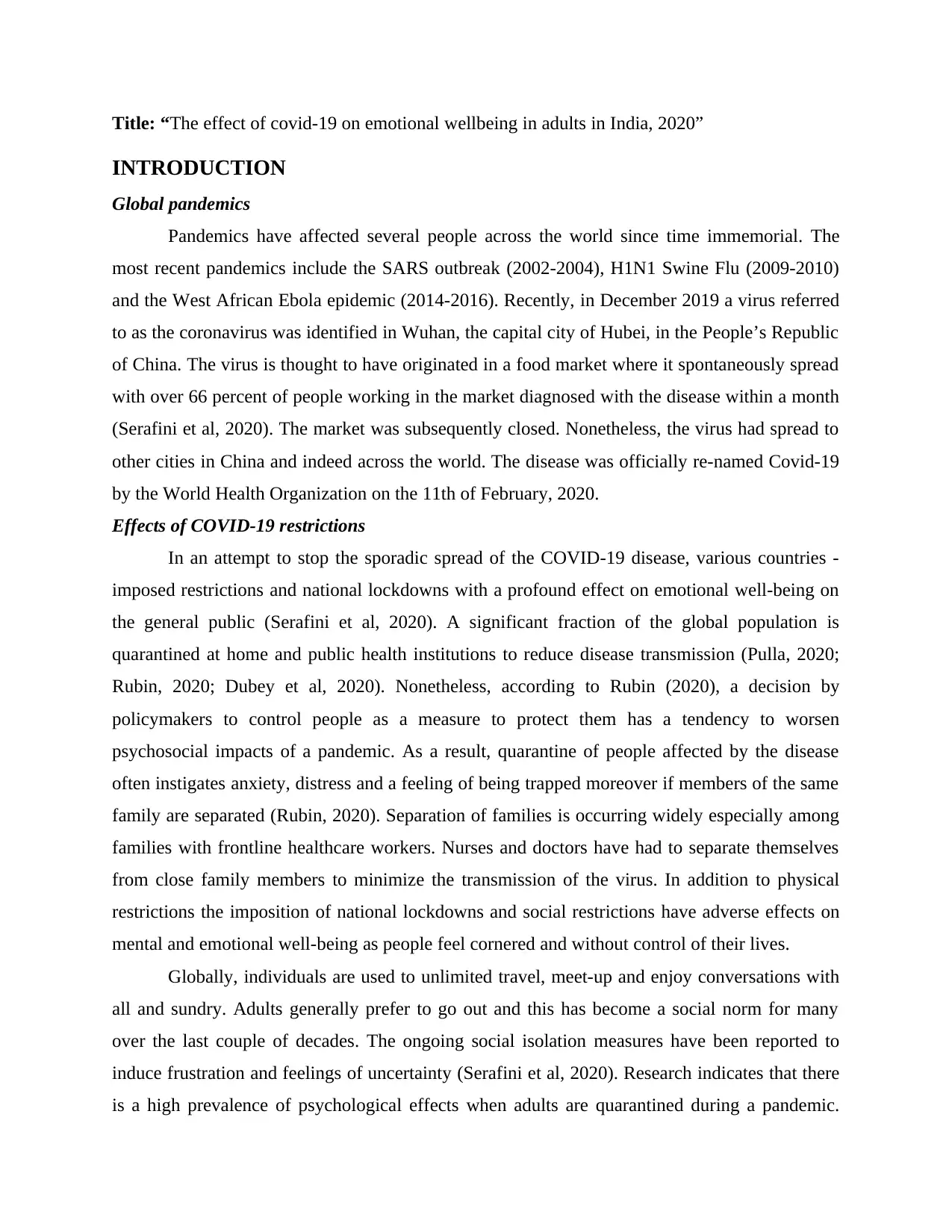
Title: “The effect of covid-19 on emotional wellbeing in adults in India, 2020”
INTRODUCTION
Global pandemics
Pandemics have affected several people across the world since time immemorial. The
most recent pandemics include the SARS outbreak (2002-2004), H1N1 Swine Flu (2009-2010)
and the West African Ebola epidemic (2014-2016). Recently, in December 2019 a virus referred
to as the coronavirus was identified in Wuhan, the capital city of Hubei, in the People’s Republic
of China. The virus is thought to have originated in a food market where it spontaneously spread
with over 66 percent of people working in the market diagnosed with the disease within a month
(Serafini et al, 2020). The market was subsequently closed. Nonetheless, the virus had spread to
other cities in China and indeed across the world. The disease was officially re-named Covid-19
by the World Health Organization on the 11th of February, 2020.
Effects of COVID-19 restrictions
In an attempt to stop the sporadic spread of the COVID-19 disease, various countries -
imposed restrictions and national lockdowns with a profound effect on emotional well-being on
the general public (Serafini et al, 2020). A significant fraction of the global population is
quarantined at home and public health institutions to reduce disease transmission (Pulla, 2020;
Rubin, 2020; Dubey et al, 2020). Nonetheless, according to Rubin (2020), a decision by
policymakers to control people as a measure to protect them has a tendency to worsen
psychosocial impacts of a pandemic. As a result, quarantine of people affected by the disease
often instigates anxiety, distress and a feeling of being trapped moreover if members of the same
family are separated (Rubin, 2020). Separation of families is occurring widely especially among
families with frontline healthcare workers. Nurses and doctors have had to separate themselves
from close family members to minimize the transmission of the virus. In addition to physical
restrictions the imposition of national lockdowns and social restrictions have adverse effects on
mental and emotional well-being as people feel cornered and without control of their lives.
Globally, individuals are used to unlimited travel, meet-up and enjoy conversations with
all and sundry. Adults generally prefer to go out and this has become a social norm for many
over the last couple of decades. The ongoing social isolation measures have been reported to
induce frustration and feelings of uncertainty (Serafini et al, 2020). Research indicates that there
is a high prevalence of psychological effects when adults are quarantined during a pandemic.
INTRODUCTION
Global pandemics
Pandemics have affected several people across the world since time immemorial. The
most recent pandemics include the SARS outbreak (2002-2004), H1N1 Swine Flu (2009-2010)
and the West African Ebola epidemic (2014-2016). Recently, in December 2019 a virus referred
to as the coronavirus was identified in Wuhan, the capital city of Hubei, in the People’s Republic
of China. The virus is thought to have originated in a food market where it spontaneously spread
with over 66 percent of people working in the market diagnosed with the disease within a month
(Serafini et al, 2020). The market was subsequently closed. Nonetheless, the virus had spread to
other cities in China and indeed across the world. The disease was officially re-named Covid-19
by the World Health Organization on the 11th of February, 2020.
Effects of COVID-19 restrictions
In an attempt to stop the sporadic spread of the COVID-19 disease, various countries -
imposed restrictions and national lockdowns with a profound effect on emotional well-being on
the general public (Serafini et al, 2020). A significant fraction of the global population is
quarantined at home and public health institutions to reduce disease transmission (Pulla, 2020;
Rubin, 2020; Dubey et al, 2020). Nonetheless, according to Rubin (2020), a decision by
policymakers to control people as a measure to protect them has a tendency to worsen
psychosocial impacts of a pandemic. As a result, quarantine of people affected by the disease
often instigates anxiety, distress and a feeling of being trapped moreover if members of the same
family are separated (Rubin, 2020). Separation of families is occurring widely especially among
families with frontline healthcare workers. Nurses and doctors have had to separate themselves
from close family members to minimize the transmission of the virus. In addition to physical
restrictions the imposition of national lockdowns and social restrictions have adverse effects on
mental and emotional well-being as people feel cornered and without control of their lives.
Globally, individuals are used to unlimited travel, meet-up and enjoy conversations with
all and sundry. Adults generally prefer to go out and this has become a social norm for many
over the last couple of decades. The ongoing social isolation measures have been reported to
induce frustration and feelings of uncertainty (Serafini et al, 2020). Research indicates that there
is a high prevalence of psychological effects when adults are quarantined during a pandemic.
⊘ This is a preview!⊘
Do you want full access?
Subscribe today to unlock all pages.

Trusted by 1+ million students worldwide
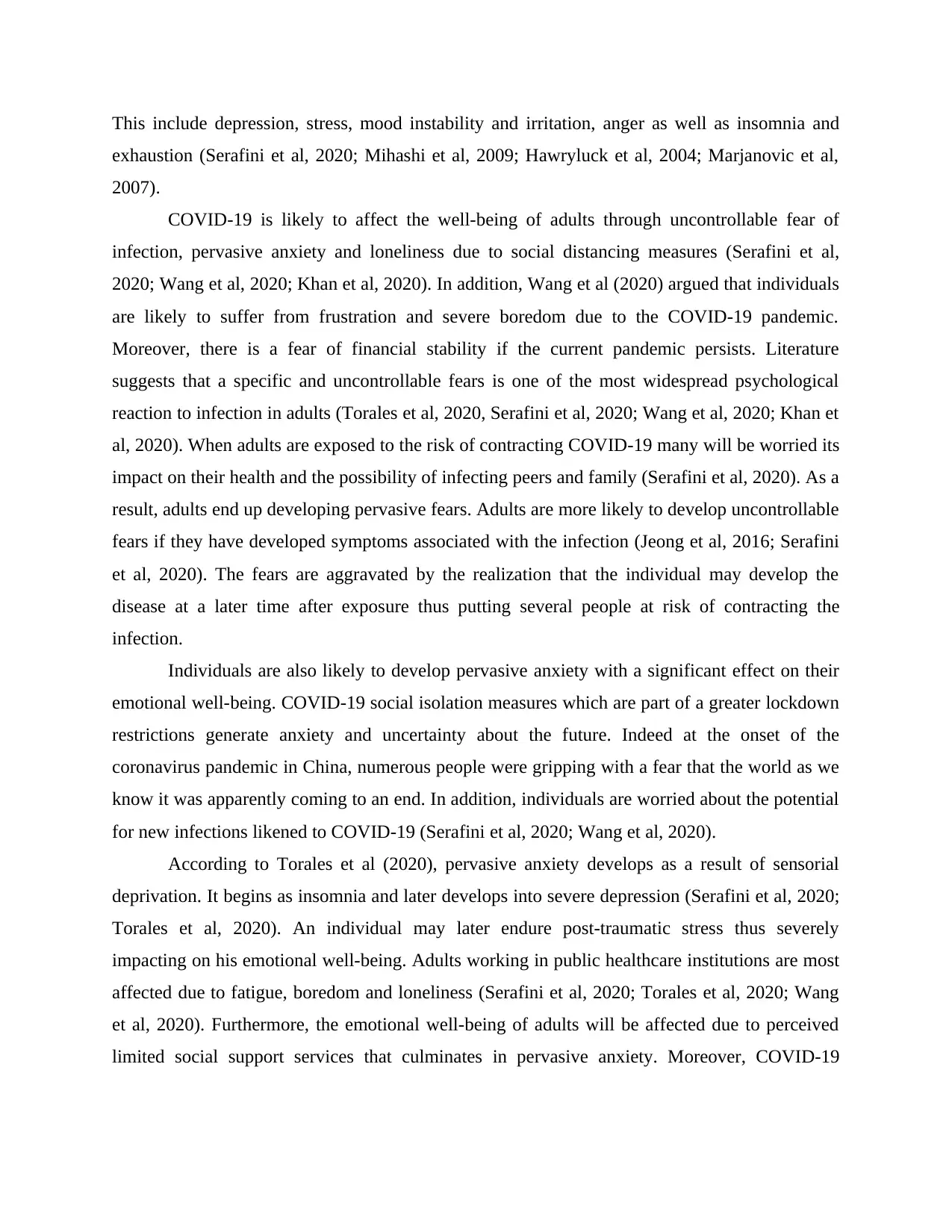
This include depression, stress, mood instability and irritation, anger as well as insomnia and
exhaustion (Serafini et al, 2020; Mihashi et al, 2009; Hawryluck et al, 2004; Marjanovic et al,
2007).
COVID-19 is likely to affect the well-being of adults through uncontrollable fear of
infection, pervasive anxiety and loneliness due to social distancing measures (Serafini et al,
2020; Wang et al, 2020; Khan et al, 2020). In addition, Wang et al (2020) argued that individuals
are likely to suffer from frustration and severe boredom due to the COVID-19 pandemic.
Moreover, there is a fear of financial stability if the current pandemic persists. Literature
suggests that a specific and uncontrollable fears is one of the most widespread psychological
reaction to infection in adults (Torales et al, 2020, Serafini et al, 2020; Wang et al, 2020; Khan et
al, 2020). When adults are exposed to the risk of contracting COVID-19 many will be worried its
impact on their health and the possibility of infecting peers and family (Serafini et al, 2020). As a
result, adults end up developing pervasive fears. Adults are more likely to develop uncontrollable
fears if they have developed symptoms associated with the infection (Jeong et al, 2016; Serafini
et al, 2020). The fears are aggravated by the realization that the individual may develop the
disease at a later time after exposure thus putting several people at risk of contracting the
infection.
Individuals are also likely to develop pervasive anxiety with a significant effect on their
emotional well-being. COVID-19 social isolation measures which are part of a greater lockdown
restrictions generate anxiety and uncertainty about the future. Indeed at the onset of the
coronavirus pandemic in China, numerous people were gripping with a fear that the world as we
know it was apparently coming to an end. In addition, individuals are worried about the potential
for new infections likened to COVID-19 (Serafini et al, 2020; Wang et al, 2020).
According to Torales et al (2020), pervasive anxiety develops as a result of sensorial
deprivation. It begins as insomnia and later develops into severe depression (Serafini et al, 2020;
Torales et al, 2020). An individual may later endure post-traumatic stress thus severely
impacting on his emotional well-being. Adults working in public healthcare institutions are most
affected due to fatigue, boredom and loneliness (Serafini et al, 2020; Torales et al, 2020; Wang
et al, 2020). Furthermore, the emotional well-being of adults will be affected due to perceived
limited social support services that culminates in pervasive anxiety. Moreover, COVID-19
exhaustion (Serafini et al, 2020; Mihashi et al, 2009; Hawryluck et al, 2004; Marjanovic et al,
2007).
COVID-19 is likely to affect the well-being of adults through uncontrollable fear of
infection, pervasive anxiety and loneliness due to social distancing measures (Serafini et al,
2020; Wang et al, 2020; Khan et al, 2020). In addition, Wang et al (2020) argued that individuals
are likely to suffer from frustration and severe boredom due to the COVID-19 pandemic.
Moreover, there is a fear of financial stability if the current pandemic persists. Literature
suggests that a specific and uncontrollable fears is one of the most widespread psychological
reaction to infection in adults (Torales et al, 2020, Serafini et al, 2020; Wang et al, 2020; Khan et
al, 2020). When adults are exposed to the risk of contracting COVID-19 many will be worried its
impact on their health and the possibility of infecting peers and family (Serafini et al, 2020). As a
result, adults end up developing pervasive fears. Adults are more likely to develop uncontrollable
fears if they have developed symptoms associated with the infection (Jeong et al, 2016; Serafini
et al, 2020). The fears are aggravated by the realization that the individual may develop the
disease at a later time after exposure thus putting several people at risk of contracting the
infection.
Individuals are also likely to develop pervasive anxiety with a significant effect on their
emotional well-being. COVID-19 social isolation measures which are part of a greater lockdown
restrictions generate anxiety and uncertainty about the future. Indeed at the onset of the
coronavirus pandemic in China, numerous people were gripping with a fear that the world as we
know it was apparently coming to an end. In addition, individuals are worried about the potential
for new infections likened to COVID-19 (Serafini et al, 2020; Wang et al, 2020).
According to Torales et al (2020), pervasive anxiety develops as a result of sensorial
deprivation. It begins as insomnia and later develops into severe depression (Serafini et al, 2020;
Torales et al, 2020). An individual may later endure post-traumatic stress thus severely
impacting on his emotional well-being. Adults working in public healthcare institutions are most
affected due to fatigue, boredom and loneliness (Serafini et al, 2020; Torales et al, 2020; Wang
et al, 2020). Furthermore, the emotional well-being of adults will be affected due to perceived
limited social support services that culminates in pervasive anxiety. Moreover, COVID-19
Paraphrase This Document
Need a fresh take? Get an instant paraphrase of this document with our AI Paraphraser
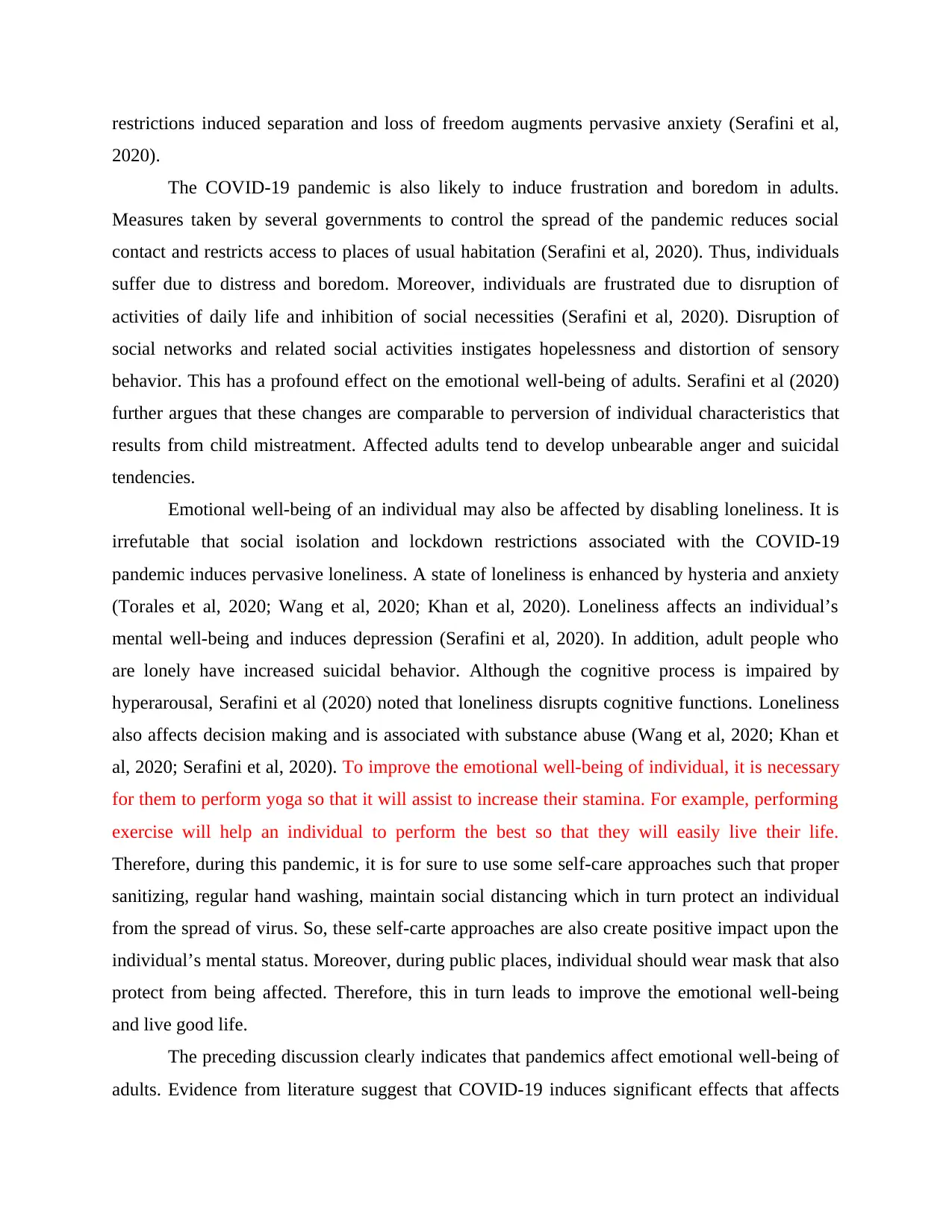
restrictions induced separation and loss of freedom augments pervasive anxiety (Serafini et al,
2020).
The COVID-19 pandemic is also likely to induce frustration and boredom in adults.
Measures taken by several governments to control the spread of the pandemic reduces social
contact and restricts access to places of usual habitation (Serafini et al, 2020). Thus, individuals
suffer due to distress and boredom. Moreover, individuals are frustrated due to disruption of
activities of daily life and inhibition of social necessities (Serafini et al, 2020). Disruption of
social networks and related social activities instigates hopelessness and distortion of sensory
behavior. This has a profound effect on the emotional well-being of adults. Serafini et al (2020)
further argues that these changes are comparable to perversion of individual characteristics that
results from child mistreatment. Affected adults tend to develop unbearable anger and suicidal
tendencies.
Emotional well-being of an individual may also be affected by disabling loneliness. It is
irrefutable that social isolation and lockdown restrictions associated with the COVID-19
pandemic induces pervasive loneliness. A state of loneliness is enhanced by hysteria and anxiety
(Torales et al, 2020; Wang et al, 2020; Khan et al, 2020). Loneliness affects an individual’s
mental well-being and induces depression (Serafini et al, 2020). In addition, adult people who
are lonely have increased suicidal behavior. Although the cognitive process is impaired by
hyperarousal, Serafini et al (2020) noted that loneliness disrupts cognitive functions. Loneliness
also affects decision making and is associated with substance abuse (Wang et al, 2020; Khan et
al, 2020; Serafini et al, 2020). To improve the emotional well-being of individual, it is necessary
for them to perform yoga so that it will assist to increase their stamina. For example, performing
exercise will help an individual to perform the best so that they will easily live their life.
Therefore, during this pandemic, it is for sure to use some self-care approaches such that proper
sanitizing, regular hand washing, maintain social distancing which in turn protect an individual
from the spread of virus. So, these self-carte approaches are also create positive impact upon the
individual’s mental status. Moreover, during public places, individual should wear mask that also
protect from being affected. Therefore, this in turn leads to improve the emotional well-being
and live good life.
The preceding discussion clearly indicates that pandemics affect emotional well-being of
adults. Evidence from literature suggest that COVID-19 induces significant effects that affects
2020).
The COVID-19 pandemic is also likely to induce frustration and boredom in adults.
Measures taken by several governments to control the spread of the pandemic reduces social
contact and restricts access to places of usual habitation (Serafini et al, 2020). Thus, individuals
suffer due to distress and boredom. Moreover, individuals are frustrated due to disruption of
activities of daily life and inhibition of social necessities (Serafini et al, 2020). Disruption of
social networks and related social activities instigates hopelessness and distortion of sensory
behavior. This has a profound effect on the emotional well-being of adults. Serafini et al (2020)
further argues that these changes are comparable to perversion of individual characteristics that
results from child mistreatment. Affected adults tend to develop unbearable anger and suicidal
tendencies.
Emotional well-being of an individual may also be affected by disabling loneliness. It is
irrefutable that social isolation and lockdown restrictions associated with the COVID-19
pandemic induces pervasive loneliness. A state of loneliness is enhanced by hysteria and anxiety
(Torales et al, 2020; Wang et al, 2020; Khan et al, 2020). Loneliness affects an individual’s
mental well-being and induces depression (Serafini et al, 2020). In addition, adult people who
are lonely have increased suicidal behavior. Although the cognitive process is impaired by
hyperarousal, Serafini et al (2020) noted that loneliness disrupts cognitive functions. Loneliness
also affects decision making and is associated with substance abuse (Wang et al, 2020; Khan et
al, 2020; Serafini et al, 2020). To improve the emotional well-being of individual, it is necessary
for them to perform yoga so that it will assist to increase their stamina. For example, performing
exercise will help an individual to perform the best so that they will easily live their life.
Therefore, during this pandemic, it is for sure to use some self-care approaches such that proper
sanitizing, regular hand washing, maintain social distancing which in turn protect an individual
from the spread of virus. So, these self-carte approaches are also create positive impact upon the
individual’s mental status. Moreover, during public places, individual should wear mask that also
protect from being affected. Therefore, this in turn leads to improve the emotional well-being
and live good life.
The preceding discussion clearly indicates that pandemics affect emotional well-being of
adults. Evidence from literature suggest that COVID-19 induces significant effects that affects
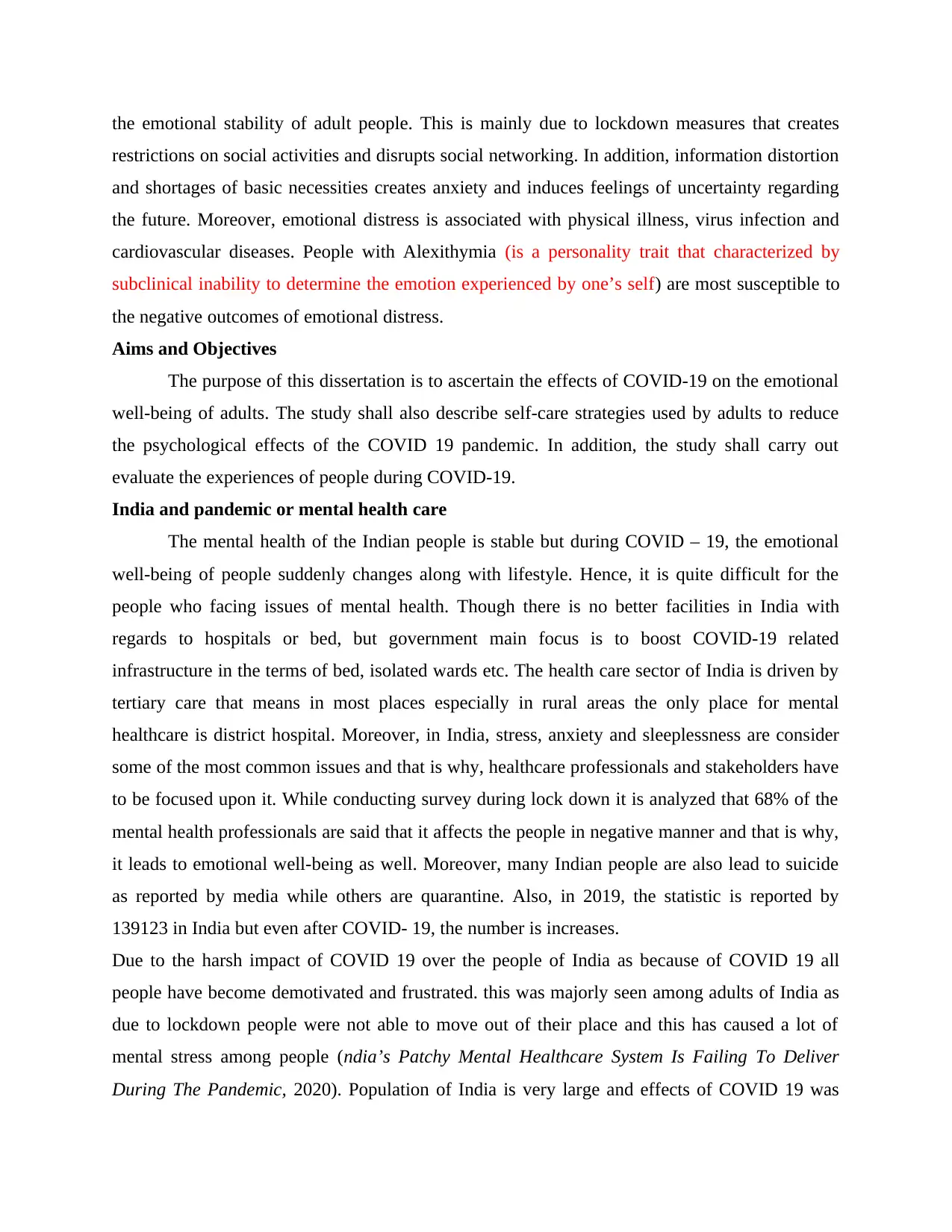
the emotional stability of adult people. This is mainly due to lockdown measures that creates
restrictions on social activities and disrupts social networking. In addition, information distortion
and shortages of basic necessities creates anxiety and induces feelings of uncertainty regarding
the future. Moreover, emotional distress is associated with physical illness, virus infection and
cardiovascular diseases. People with Alexithymia (is a personality trait that characterized by
subclinical inability to determine the emotion experienced by one’s self) are most susceptible to
the negative outcomes of emotional distress.
Aims and Objectives
The purpose of this dissertation is to ascertain the effects of COVID-19 on the emotional
well-being of adults. The study shall also describe self-care strategies used by adults to reduce
the psychological effects of the COVID 19 pandemic. In addition, the study shall carry out
evaluate the experiences of people during COVID-19.
India and pandemic or mental health care
The mental health of the Indian people is stable but during COVID – 19, the emotional
well-being of people suddenly changes along with lifestyle. Hence, it is quite difficult for the
people who facing issues of mental health. Though there is no better facilities in India with
regards to hospitals or bed, but government main focus is to boost COVID-19 related
infrastructure in the terms of bed, isolated wards etc. The health care sector of India is driven by
tertiary care that means in most places especially in rural areas the only place for mental
healthcare is district hospital. Moreover, in India, stress, anxiety and sleeplessness are consider
some of the most common issues and that is why, healthcare professionals and stakeholders have
to be focused upon it. While conducting survey during lock down it is analyzed that 68% of the
mental health professionals are said that it affects the people in negative manner and that is why,
it leads to emotional well-being as well. Moreover, many Indian people are also lead to suicide
as reported by media while others are quarantine. Also, in 2019, the statistic is reported by
139123 in India but even after COVID- 19, the number is increases.
Due to the harsh impact of COVID 19 over the people of India as because of COVID 19 all
people have become demotivated and frustrated. this was majorly seen among adults of India as
due to lockdown people were not able to move out of their place and this has caused a lot of
mental stress among people (ndia’s Patchy Mental Healthcare System Is Failing To Deliver
During The Pandemic, 2020). Population of India is very large and effects of COVID 19 was
restrictions on social activities and disrupts social networking. In addition, information distortion
and shortages of basic necessities creates anxiety and induces feelings of uncertainty regarding
the future. Moreover, emotional distress is associated with physical illness, virus infection and
cardiovascular diseases. People with Alexithymia (is a personality trait that characterized by
subclinical inability to determine the emotion experienced by one’s self) are most susceptible to
the negative outcomes of emotional distress.
Aims and Objectives
The purpose of this dissertation is to ascertain the effects of COVID-19 on the emotional
well-being of adults. The study shall also describe self-care strategies used by adults to reduce
the psychological effects of the COVID 19 pandemic. In addition, the study shall carry out
evaluate the experiences of people during COVID-19.
India and pandemic or mental health care
The mental health of the Indian people is stable but during COVID – 19, the emotional
well-being of people suddenly changes along with lifestyle. Hence, it is quite difficult for the
people who facing issues of mental health. Though there is no better facilities in India with
regards to hospitals or bed, but government main focus is to boost COVID-19 related
infrastructure in the terms of bed, isolated wards etc. The health care sector of India is driven by
tertiary care that means in most places especially in rural areas the only place for mental
healthcare is district hospital. Moreover, in India, stress, anxiety and sleeplessness are consider
some of the most common issues and that is why, healthcare professionals and stakeholders have
to be focused upon it. While conducting survey during lock down it is analyzed that 68% of the
mental health professionals are said that it affects the people in negative manner and that is why,
it leads to emotional well-being as well. Moreover, many Indian people are also lead to suicide
as reported by media while others are quarantine. Also, in 2019, the statistic is reported by
139123 in India but even after COVID- 19, the number is increases.
Due to the harsh impact of COVID 19 over the people of India as because of COVID 19 all
people have become demotivated and frustrated. this was majorly seen among adults of India as
due to lockdown people were not able to move out of their place and this has caused a lot of
mental stress among people (ndia’s Patchy Mental Healthcare System Is Failing To Deliver
During The Pandemic, 2020). Population of India is very large and effects of COVID 19 was
⊘ This is a preview!⊘
Do you want full access?
Subscribe today to unlock all pages.

Trusted by 1+ million students worldwide
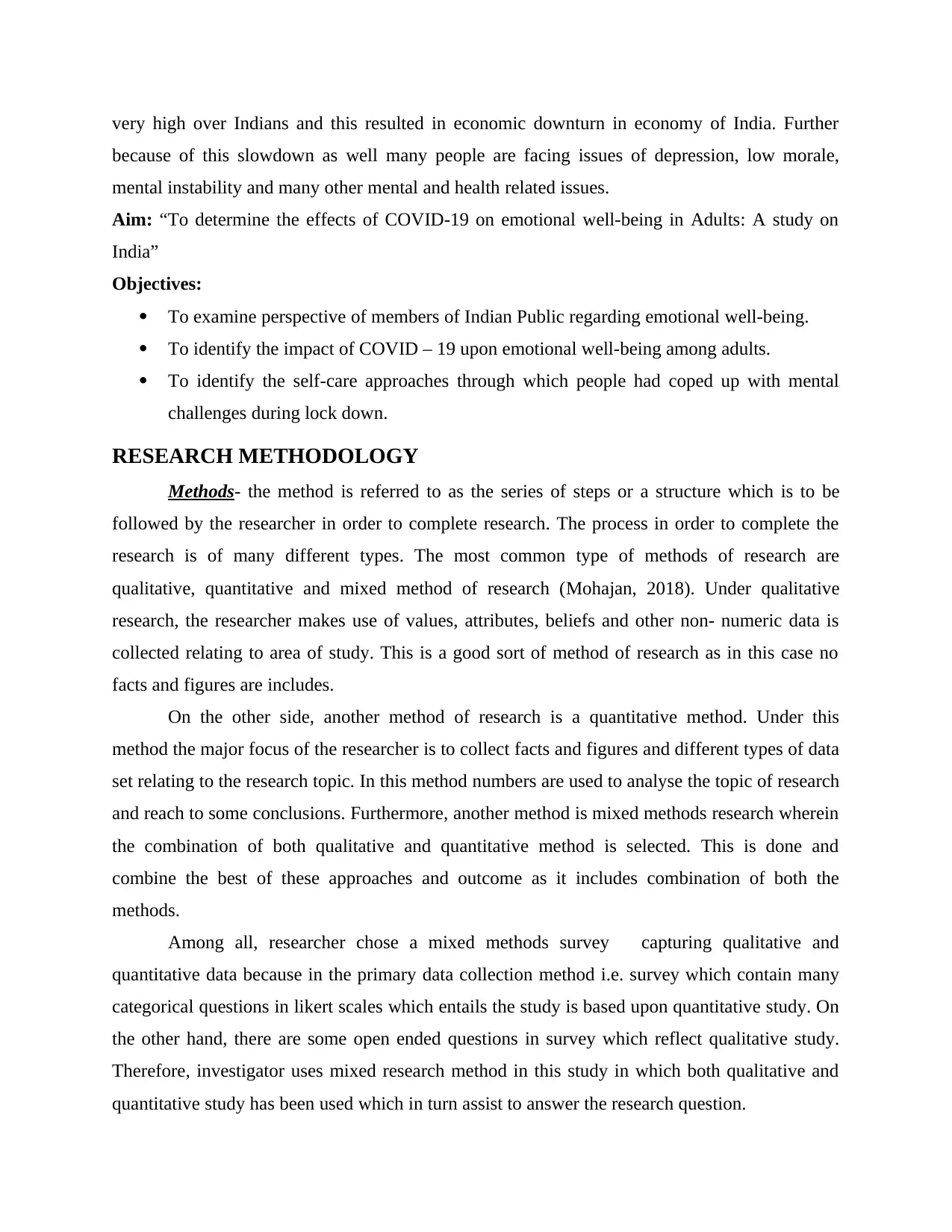
very high over Indians and this resulted in economic downturn in economy of India. Further
because of this slowdown as well many people are facing issues of depression, low morale,
mental instability and many other mental and health related issues.
Aim: “To determine the effects of COVID-19 on emotional well-being in Adults: A study on
India”
Objectives:
To examine perspective of members of Indian Public regarding emotional well-being.
To identify the impact of COVID – 19 upon emotional well-being among adults.
To identify the self-care approaches through which people had coped up with mental
challenges during lock down.
RESEARCH METHODOLOGY
Methods- the method is referred to as the series of steps or a structure which is to be
followed by the researcher in order to complete research. The process in order to complete the
research is of many different types. The most common type of methods of research are
qualitative, quantitative and mixed method of research (Mohajan, 2018). Under qualitative
research, the researcher makes use of values, attributes, beliefs and other non- numeric data is
collected relating to area of study. This is a good sort of method of research as in this case no
facts and figures are includes.
On the other side, another method of research is a quantitative method. Under this
method the major focus of the researcher is to collect facts and figures and different types of data
set relating to the research topic. In this method numbers are used to analyse the topic of research
and reach to some conclusions. Furthermore, another method is mixed methods research wherein
the combination of both qualitative and quantitative method is selected. This is done and
combine the best of these approaches and outcome as it includes combination of both the
methods.
Among all, researcher chose a mixed methods survey capturing qualitative and
quantitative data because in the primary data collection method i.e. survey which contain many
categorical questions in likert scales which entails the study is based upon quantitative study. On
the other hand, there are some open ended questions in survey which reflect qualitative study.
Therefore, investigator uses mixed research method in this study in which both qualitative and
quantitative study has been used which in turn assist to answer the research question.
because of this slowdown as well many people are facing issues of depression, low morale,
mental instability and many other mental and health related issues.
Aim: “To determine the effects of COVID-19 on emotional well-being in Adults: A study on
India”
Objectives:
To examine perspective of members of Indian Public regarding emotional well-being.
To identify the impact of COVID – 19 upon emotional well-being among adults.
To identify the self-care approaches through which people had coped up with mental
challenges during lock down.
RESEARCH METHODOLOGY
Methods- the method is referred to as the series of steps or a structure which is to be
followed by the researcher in order to complete research. The process in order to complete the
research is of many different types. The most common type of methods of research are
qualitative, quantitative and mixed method of research (Mohajan, 2018). Under qualitative
research, the researcher makes use of values, attributes, beliefs and other non- numeric data is
collected relating to area of study. This is a good sort of method of research as in this case no
facts and figures are includes.
On the other side, another method of research is a quantitative method. Under this
method the major focus of the researcher is to collect facts and figures and different types of data
set relating to the research topic. In this method numbers are used to analyse the topic of research
and reach to some conclusions. Furthermore, another method is mixed methods research wherein
the combination of both qualitative and quantitative method is selected. This is done and
combine the best of these approaches and outcome as it includes combination of both the
methods.
Among all, researcher chose a mixed methods survey capturing qualitative and
quantitative data because in the primary data collection method i.e. survey which contain many
categorical questions in likert scales which entails the study is based upon quantitative study. On
the other hand, there are some open ended questions in survey which reflect qualitative study.
Therefore, investigator uses mixed research method in this study in which both qualitative and
quantitative study has been used which in turn assist to answer the research question.
Paraphrase This Document
Need a fresh take? Get an instant paraphrase of this document with our AI Paraphraser
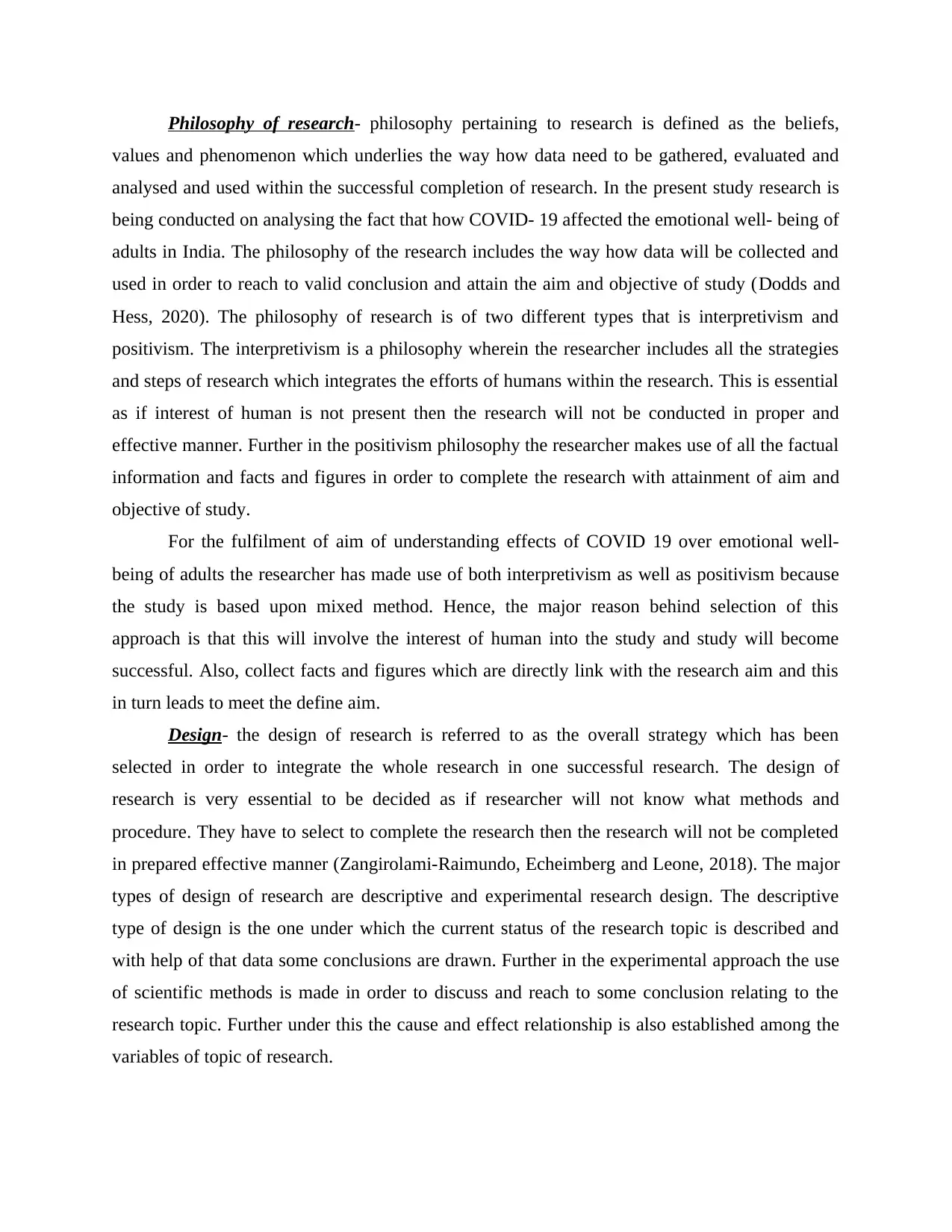
Philosophy of research- philosophy pertaining to research is defined as the beliefs,
values and phenomenon which underlies the way how data need to be gathered, evaluated and
analysed and used within the successful completion of research. In the present study research is
being conducted on analysing the fact that how COVID- 19 affected the emotional well- being of
adults in India. The philosophy of the research includes the way how data will be collected and
used in order to reach to valid conclusion and attain the aim and objective of study (Dodds and
Hess, 2020). The philosophy of research is of two different types that is interpretivism and
positivism. The interpretivism is a philosophy wherein the researcher includes all the strategies
and steps of research which integrates the efforts of humans within the research. This is essential
as if interest of human is not present then the research will not be conducted in proper and
effective manner. Further in the positivism philosophy the researcher makes use of all the factual
information and facts and figures in order to complete the research with attainment of aim and
objective of study.
For the fulfilment of aim of understanding effects of COVID 19 over emotional well-
being of adults the researcher has made use of both interpretivism as well as positivism because
the study is based upon mixed method. Hence, the major reason behind selection of this
approach is that this will involve the interest of human into the study and study will become
successful. Also, collect facts and figures which are directly link with the research aim and this
in turn leads to meet the define aim.
Design- the design of research is referred to as the overall strategy which has been
selected in order to integrate the whole research in one successful research. The design of
research is very essential to be decided as if researcher will not know what methods and
procedure. They have to select to complete the research then the research will not be completed
in prepared effective manner (Zangirolami-Raimundo, Echeimberg and Leone, 2018). The major
types of design of research are descriptive and experimental research design. The descriptive
type of design is the one under which the current status of the research topic is described and
with help of that data some conclusions are drawn. Further in the experimental approach the use
of scientific methods is made in order to discuss and reach to some conclusion relating to the
research topic. Further under this the cause and effect relationship is also established among the
variables of topic of research.
values and phenomenon which underlies the way how data need to be gathered, evaluated and
analysed and used within the successful completion of research. In the present study research is
being conducted on analysing the fact that how COVID- 19 affected the emotional well- being of
adults in India. The philosophy of the research includes the way how data will be collected and
used in order to reach to valid conclusion and attain the aim and objective of study (Dodds and
Hess, 2020). The philosophy of research is of two different types that is interpretivism and
positivism. The interpretivism is a philosophy wherein the researcher includes all the strategies
and steps of research which integrates the efforts of humans within the research. This is essential
as if interest of human is not present then the research will not be conducted in proper and
effective manner. Further in the positivism philosophy the researcher makes use of all the factual
information and facts and figures in order to complete the research with attainment of aim and
objective of study.
For the fulfilment of aim of understanding effects of COVID 19 over emotional well-
being of adults the researcher has made use of both interpretivism as well as positivism because
the study is based upon mixed method. Hence, the major reason behind selection of this
approach is that this will involve the interest of human into the study and study will become
successful. Also, collect facts and figures which are directly link with the research aim and this
in turn leads to meet the define aim.
Design- the design of research is referred to as the overall strategy which has been
selected in order to integrate the whole research in one successful research. The design of
research is very essential to be decided as if researcher will not know what methods and
procedure. They have to select to complete the research then the research will not be completed
in prepared effective manner (Zangirolami-Raimundo, Echeimberg and Leone, 2018). The major
types of design of research are descriptive and experimental research design. The descriptive
type of design is the one under which the current status of the research topic is described and
with help of that data some conclusions are drawn. Further in the experimental approach the use
of scientific methods is made in order to discuss and reach to some conclusion relating to the
research topic. Further under this the cause and effect relationship is also established among the
variables of topic of research.
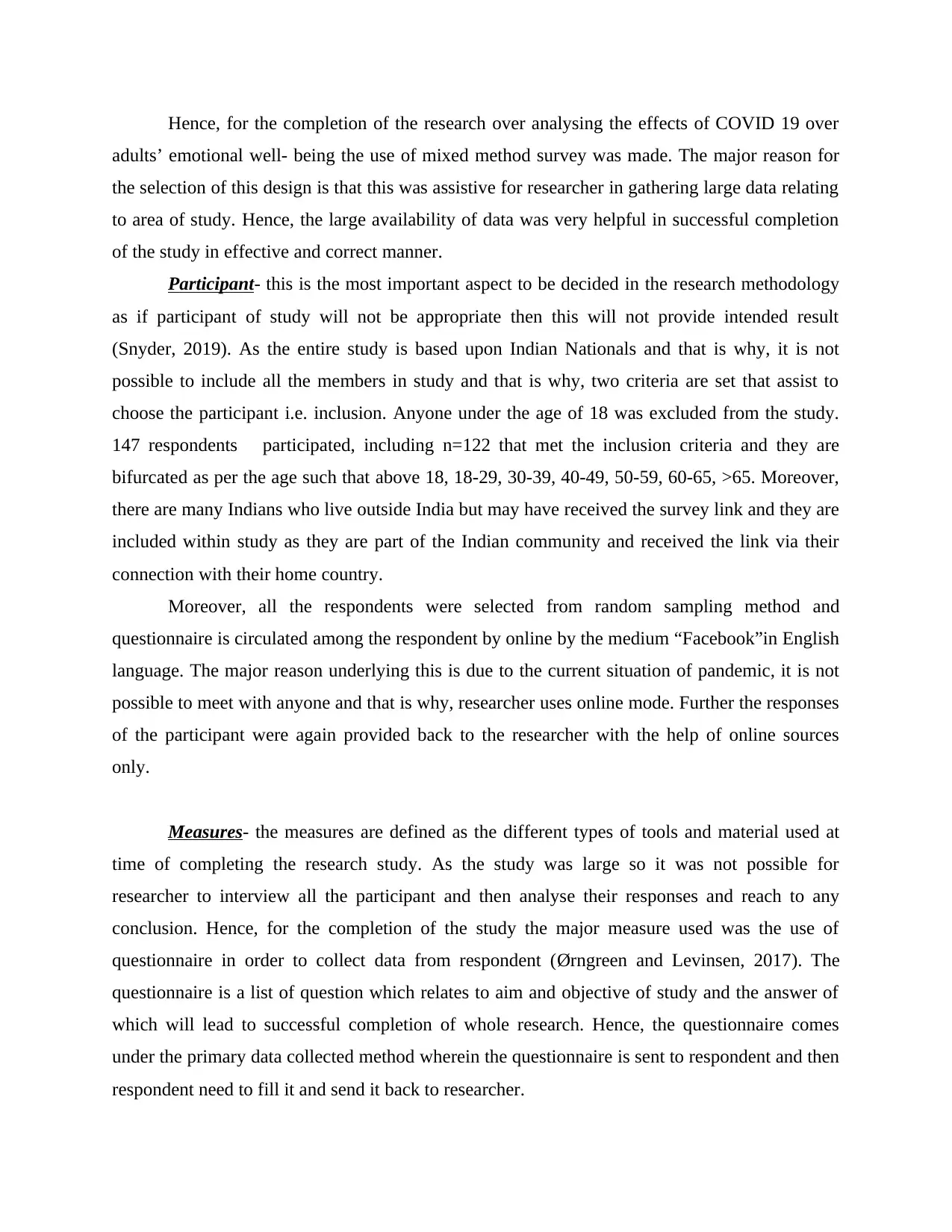
Hence, for the completion of the research over analysing the effects of COVID 19 over
adults’ emotional well- being the use of mixed method survey was made. The major reason for
the selection of this design is that this was assistive for researcher in gathering large data relating
to area of study. Hence, the large availability of data was very helpful in successful completion
of the study in effective and correct manner.
Participant- this is the most important aspect to be decided in the research methodology
as if participant of study will not be appropriate then this will not provide intended result
(Snyder, 2019). As the entire study is based upon Indian Nationals and that is why, it is not
possible to include all the members in study and that is why, two criteria are set that assist to
choose the participant i.e. inclusion. Anyone under the age of 18 was excluded from the study.
147 respondents participated, including n=122 that met the inclusion criteria and they are
bifurcated as per the age such that above 18, 18-29, 30-39, 40-49, 50-59, 60-65, >65. Moreover,
there are many Indians who live outside India but may have received the survey link and they are
included within study as they are part of the Indian community and received the link via their
connection with their home country.
Moreover, all the respondents were selected from random sampling method and
questionnaire is circulated among the respondent by online by the medium “Facebook”in English
language. The major reason underlying this is due to the current situation of pandemic, it is not
possible to meet with anyone and that is why, researcher uses online mode. Further the responses
of the participant were again provided back to the researcher with the help of online sources
only.
Measures- the measures are defined as the different types of tools and material used at
time of completing the research study. As the study was large so it was not possible for
researcher to interview all the participant and then analyse their responses and reach to any
conclusion. Hence, for the completion of the study the major measure used was the use of
questionnaire in order to collect data from respondent (Ørngreen and Levinsen, 2017). The
questionnaire is a list of question which relates to aim and objective of study and the answer of
which will lead to successful completion of whole research. Hence, the questionnaire comes
under the primary data collected method wherein the questionnaire is sent to respondent and then
respondent need to fill it and send it back to researcher.
adults’ emotional well- being the use of mixed method survey was made. The major reason for
the selection of this design is that this was assistive for researcher in gathering large data relating
to area of study. Hence, the large availability of data was very helpful in successful completion
of the study in effective and correct manner.
Participant- this is the most important aspect to be decided in the research methodology
as if participant of study will not be appropriate then this will not provide intended result
(Snyder, 2019). As the entire study is based upon Indian Nationals and that is why, it is not
possible to include all the members in study and that is why, two criteria are set that assist to
choose the participant i.e. inclusion. Anyone under the age of 18 was excluded from the study.
147 respondents participated, including n=122 that met the inclusion criteria and they are
bifurcated as per the age such that above 18, 18-29, 30-39, 40-49, 50-59, 60-65, >65. Moreover,
there are many Indians who live outside India but may have received the survey link and they are
included within study as they are part of the Indian community and received the link via their
connection with their home country.
Moreover, all the respondents were selected from random sampling method and
questionnaire is circulated among the respondent by online by the medium “Facebook”in English
language. The major reason underlying this is due to the current situation of pandemic, it is not
possible to meet with anyone and that is why, researcher uses online mode. Further the responses
of the participant were again provided back to the researcher with the help of online sources
only.
Measures- the measures are defined as the different types of tools and material used at
time of completing the research study. As the study was large so it was not possible for
researcher to interview all the participant and then analyse their responses and reach to any
conclusion. Hence, for the completion of the study the major measure used was the use of
questionnaire in order to collect data from respondent (Ørngreen and Levinsen, 2017). The
questionnaire is a list of question which relates to aim and objective of study and the answer of
which will lead to successful completion of whole research. Hence, the questionnaire comes
under the primary data collected method wherein the questionnaire is sent to respondent and then
respondent need to fill it and send it back to researcher.
⊘ This is a preview!⊘
Do you want full access?
Subscribe today to unlock all pages.

Trusted by 1+ million students worldwide
1 out of 61
Related Documents
Your All-in-One AI-Powered Toolkit for Academic Success.
+13062052269
info@desklib.com
Available 24*7 on WhatsApp / Email
![[object Object]](/_next/static/media/star-bottom.7253800d.svg)
Unlock your academic potential
Copyright © 2020–2026 A2Z Services. All Rights Reserved. Developed and managed by ZUCOL.





